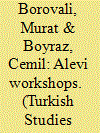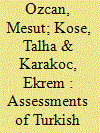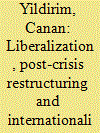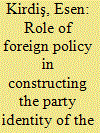| Srl | Item |
| 1 |
ID:
139251


|
|
|
|
|
| Summary/Abstract |
This paper aims to analyze the Alevi Opening in 2009 by the Justice and Development Party. Based on a close reading of the manuscripts of the seven workshops and the subsequently published report, a critical analysis of the initiative by the government is presented. It is argued that the organization and the composition of the workshops were not conducive to attaining a set of solutions to the problems encountered by the Alevis. The article concludes by stating that, though a historic step in state–Alevi relations, the Opening has not been successful in producing a politically significant result.
|
|
|
|
|
|
|
|
|
|
|
|
|
|
|
|
| 2 |
ID:
139254


|
|
|
|
|
| Summary/Abstract |
Using original public-opinion polls and elite interviews conducted in 2012, this article analyzes the perceptions of Turkish foreign policy regarding the Arab Uprisings and the Syrian conflict in three Middle Eastern countries, Egypt, Iraq and Iran. It finds that ethnic, sectarian and religious groups in these three countries vary significantly in their views on Turkish foreign policy regarding both the Arab Uprisings and the Syrian conflict, although the same identity-related factors have a less salient effect at the elite level. The findings also suggest that the intersection of ethnicity and sect shapes people's attitudes toward Turkish foreign policy in Iran and Iraq. Sunnis, except for Kurds in Iran and Iraq, tend to have a positive view of Turkish foreign policy, while Shia Turkomans in Iraq tend to have a negative one.
|
|
|
|
|
|
|
|
|
|
|
|
|
|
|
|
| 3 |
ID:
139255


|
|
|
|
|
| Summary/Abstract |
This article examines the process within which history was institutionalized in the Ottoman Empire. Institutional space for history had begun to be constructed within the context of interstate rivalry during the mid-nineteenth century. History had the task of “proving” the fact that the Turks had been from the very beginning a part of the “Western civilization.” The essential period for the institutionalization history was that of the regime of the Committee of Union and Progress in 1908–18, providing historians to emphasize the role of the “people” in history along with large structures of geography and “civilizations.” Once professional institutions were established and various history journals began to be published in this context, historians also began to pay due attention to the professional standards of the discipline. Despite the exclusionary tendencies of the Turkish official history, institutionalization during a revolutionary period functioned as a significant counter-tendency as institutions are path-dependent.
|
|
|
|
|
|
|
|
|
|
|
|
|
|
|
|
| 4 |
ID:
139257


|
|
|
|
|
| Summary/Abstract |
This study provides a historical review of the transformation of the Turkish banking sector since the initiation of the financial liberalization program in 1980. It demonstrates the roles of macroeconomic, institutional and firm-level factors in the evolution of market and ownership structures as well as the performance of the sector. It focuses on the penetration of foreign banks in the Turkish market and the more recently observed entries of Turkish banks into neighboring countries. It contributes to the literature by illustrating how the domestic macroeconomic and institutional environment together with international banking circumstances affect the processes and outcomes of internationalization in emerging banking markets.
|
|
|
|
|
|
|
|
|
|
|
|
|
|
|
|
| 5 |
ID:
139252


|
|
|
|
|
| Summary/Abstract |
The Society for the Dissemination of Free Ideas (SDFI) was the first liberal civil society organization in Turkey. To this date, little attention has been paid to its actions and ideology. Taking the history of the SDFI as its central focus, this article aims to give an account of liberal opposition to authoritarianism in Turkey in the late 1940s, analyzing the factors which led self-proclaimed liberals to unify and eventually disband their alliance, and the novelties and limits of liberal thought at the time.
|
|
|
|
|
|
|
|
|
|
|
|
|
|
|
|
| 6 |
ID:
139256


|
|
|
|
|
| Summary/Abstract |
Despite major differences among political systems, one can conduct new research on pledge fulfillment by examining previously ignored cases. Accordingly, this article extends the literature by developing a new analysis for the Turkish context. The main contribution of this paper is the introduction of explicit models, which evaluate political pledges and their fulfillment by using an original data set. In particular, this study reveals the following facts: (a) in a comparative perspective, pledge fulfillment is low in Turkey and (b) its governmental forms and economic performance have an impact on pledge fulfillment.
|
|
|
|
|
|
|
|
|
|
|
|
|
|
|
|
| 7 |
ID:
139253


|
|
|
|
|
| Summary/Abstract |
Since the start of its tenure, the Justice and Development Party's (AKP) departure from traditional Turkish foreign policy identity has elicited praise and criticism. This article addresses this development by discussing how the AKP has impacted traditional Turkish foreign policy identity, and how, in return, Turkish foreign policy identity has impacted the party identity of the AKP in domestic politics. In particular, this study examines the domestic politics–foreign policy continuum by exploring how foreign policy has served both as an extension of domestic politics as well as a medium to restructure domestic politics during the AKP's three terms in office.
|
|
|
|
|
|
|
|
|
|
|
|
|
|
|
|